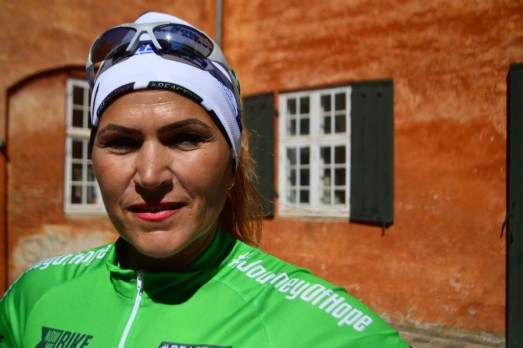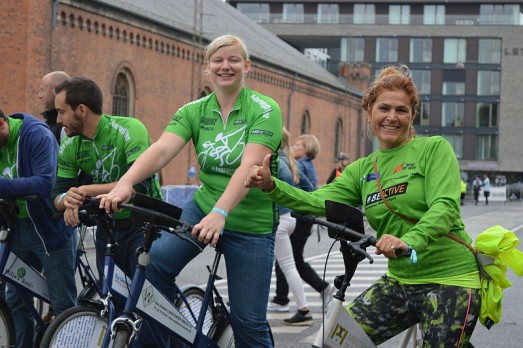"They say when I'm on a bike I'm like the Bionic Woman!": How being active gave Aysel Atas the super-power to battle on
26/08/2016

For Aysel Atas, the Journey of Hope represents a lifelong journey that has seen her move from Turkey to the Netherlands as a child, be married by the time she was 16 and battle breast cancer at the age of 36.
Aysel believes that being active and moving forward has been a common thread in overcoming what life has thrown her way. During her cancer treatment, she was determined to finish her studies and graduate with a Master's Degree in Management Economy and Law with the rest of her classmates. She succeeded, but finding a job at the end of the road wasn’t easy, so at the age of 43 she moved back to Turkey and started again. Now she is working with what she loves: being active and using her cycling skills to help people who are going through similar battles, such as autistic children, vision impaired people and other women with breast cancer.
ISCA spoke to Aysel during the Journey of Hope team’s tour through Denmark.
How do you feel the Journey of Hope has been going the first few days?
Aysel: I’ve enjoyed it until now. Everything has gone very well and we have a great team. I like cycling and when I’m on the bike I can forget everything. Just looking around and breathing in the air. It’s great.
What motivated you to join the Journey of Hope team?
Aysel: I always wanted to go on a long tour, especially in Europe. This was a good reason to start with a couple of people before I go on my own. It felt right.
And I guess in this situation hope means something more personal to you. Could you tell us a little bit about that?
Aysel: Yes, because what we’re doing, “BeActive”, is what helped me go on, because I have had a very difficult past – both psychologically and physically. I was married in my 16th year and a mother in my 17th. I had a bad marriage and I could just forget what was happening to me just by being active – by doing sport, by swimming, everything. After my divorce, I got sick, I got cancer, and during my illness I went on. That kept me on my feet.
You’ve mentioned that some people told you that you couldn’t keep doing what you were doing when you got sick.
Aysel: Yes, when I had cancer and I was in the hospital having chemotherapy my mother also passed on from breast cancer. So again, psychologically and physically I was on the bottom. So then again, sport was the only way for me to come out of this situation and forget what had happened. Or just not think about it, because when you think about what happens to you, you lay down – it doesn’t help you.
When I was ill, I studied. Everyone said when I lost my mother and was busy with my treatments to “sit down and rest”. And I said, “that’s not going to help me. When I’m ready after all this shit, I can graduate, get a job and I can go to work. I don’t have the time to lay down.” I felt that if I stood still, I would go down. So I did what I did, and my teachers from my education were surprised about me. They said, “Wow, we’ve never met anybody like you. With so many things going on you are still going and you’re doing well.” Because I never failed. I graduated with the other students and I held with them.
And you finished a Master’s degree?
Aysel: Yes, but after that I couldn’t get a job because of the crisis in Holland. So I’d had enough of being rejected every time I went for a job, because of my age mostly, or I was over-qualified or under-qualified for the job. So on my birthday I went – I took the plane and went to Izmir, where I knew nobody and had nothing there, and I began a new life. I thought I had to do something, because in several years I’d be too old to start again.

So what does biking mean to you, because you started biking when you lived in the Netherlands, didn’t you?
Aysel: I was eight years old when I moved to Holland with my family, and I couldn’t ride a bike. So I took a bike from my neighbour and I tried and I tried. I fell, I had bruises and I didn’t give up. In two or three days I could ride. Now in Turkey I’m giving lessons to autistic kids with severe conditions. Some can’t even hold a bike at the beginning. At first it made me cry when I saw how happy they were when they found out they could ride. One of the families couldn’t believe that their kid could ride. They came to the lesson and they couldn’t believe their eyes.
Besides that, I cycle with blind people on tandem bikes. I’m their events coordinator and arrange for them to ride somewhere. I search for new pilots – the pilot is the one who is riding in front, and the co-pilot is the blind person. So now we’re going to camp with them and teach them how to survive outside. In fact, the NowWeBike tour side event in 2015 was the first event I organised with the blind and now we have several sponsors. Some of my friends pooled their money and bought a tandem bike for them so we now have four tandems, but we need more.
And cycling long distance, what’s the attraction for you to go on a really long bike ride?
Aysel: I like to go further every time and push myself to go further. They say to me that when I’m on a bicycle I’m like the Bionic Woman! Also in Turkey it’s really nice to ride there because we have beautiful nature. To get to some places it’s too far to walk and in the car you miss the scenery because it goes too fast. But with a bike you can see everything.
What’s next for you after the Journey of Hope? Do you have any ambitions to go on longer tours in different places?
Aysel: Yes, I have one project with a couple of friends to go to Taiwan, to rent bikes there and just see what happens.
And what’s it like going around with a group of people? You’re in a team of four, so how is it to share this experience and spend so much time together?
Aysel: We don’t know each other very well, but if you think “we are a team and we have to be together for the whole month”, then it’s easy for me. They call me Xena, the Warrior Princess, on the bike but also the angel of the bikers. I try to keep the group together and I like that.
What do you hope for during this Journey of Hope?
Aysel: I don’t understand people when they say, “I don’t have enough time to be active”. I say, “There’s always the time! Where are your priorities?” Because of problems with obesity, you have to get people outside. Just like with the Pokemon game. It’s a good game, but when I was in Copenhagen I also noticed that it’s a little bit dangerous. I saw a mother screaming after her kid because they were just walking away without looking where they were going. But on the other side, it’s a good thing. People have to come out of their house.
The Journey of Hope is co-funded by the European Commission’s Erasmus+ Sport programme and promotes the #BeActive message.
Interview and story by Rachel Payne, ISCA
Photos by Maria Lourdes Gonzalez and courtesy of Aysel Atas

Posted on 26/08/2016 by Rachel Payne, ISCA

